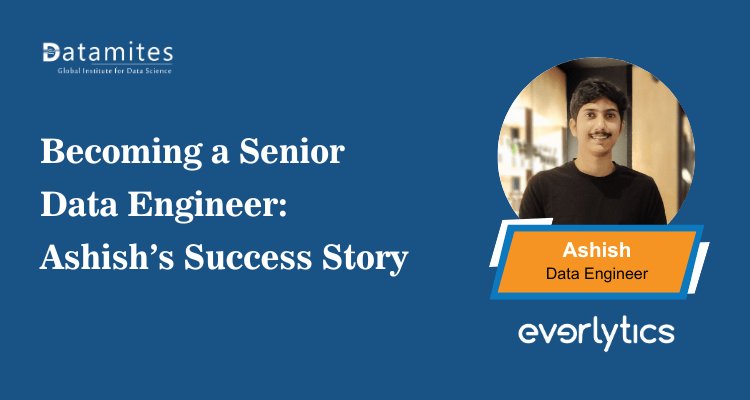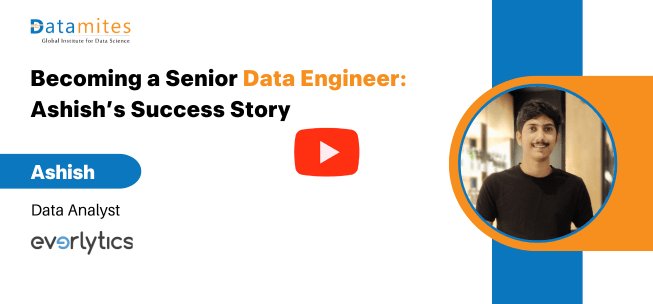Becoming a Senior Data Engineer: Ashish’s Success Story
Ashish’s journey showcases how structured learning, hands-on projects, and industry-relevant skills can pave the way to becoming a Senior Data Engineer. His story highlights the practical steps and dedication needed to excel in the data engineering field.

Ashish transformed his curiosity for technology into a successful career in Data Engineering through structured learning and hands-on experience. His journey highlights how persistence and the right guidance can open doors in the tech industry. Ashish’s path from a Computer Science graduate to a Senior Data Engineer at Everlytics Data Science showcases how curiosity, dedication, and practical learning can turn challenges into opportunities. Initially navigating complex projects and new technologies, he leveraged real-world experience and mentorship to master critical data engineering skills.
By working on diverse projects and collaborating closely with experienced professionals, Ashish applied his knowledge to practical scenarios, building both expertise and confidence. His journey stands as a testament for aspiring data professionals, demonstrating that structured learning, flexibility, and continuous growth can lead to a rewarding career, making Ashish an inspiring DataMites success story.
How Ashish Built His Career as a Senior Data Engineer with DataMites
Discover how Ashish became a Senior Data Engineer through structured learning, real-world projects, and practical experience.
Q1. How did your journey into data engineering begin?
When I was in my third year of engineering, I started hearing a lot about big data and data science. Initially, I wasn’t sure if it was my path since I came from an electronics background. But during one project, I used Excel extensively for managing time and resources. That experience sparked my interest in understanding data patterns and their impact, eventually leading me toward data engineering.
Q2. You’ve been with the same company for five years. Why did you choose to stay?
The main reason I enjoy my role is the freedom and learning opportunities at Everlytics Data Science. Working directly with our CEO, who has over 20 years of experience, gives me invaluable exposure. The variety of projects and the flexibility I have make it an ideal environment for continuous growth, where I contribute as a Senior Data Engineer.
Q3. What skills helped you bridge the gap between data science training and becoming a data engineer?
Data wrangling and handling large datasets are key. You must be comfortable with Python and SQL, as they are the backbone of most data roles. These two skills form the base for working with any enterprise data systems.
Q4. How did you prepare for your first job interview?
During the COVID period, I practiced using real-world datasets such as COVID API data. I visualized data, worked on cleaning and transformation, and learned how to find meaningful patterns. This hands-on practice helped me confidently handle technical questions during the interview.
Q5. What tools and technologies should beginners focus on for data engineering?
Start with Python and SQL as your foundation. Then explore ETL tools like Informatica and Airflow, which are commonly used for managing data pipelines. Understanding how data moves from source to destination and working with data warehousing concepts will also be very beneficial.
Q6. How should beginners present their projects during interviews?
Most students showcase projects using simple CSV files. To stand out, connect your work to real databases or live data streams. Working with SQL databases or streaming data (like Kafka) gives your portfolio more credibility and demonstrates real-world experience.
Q7. How many interviews did you attend before landing your first job?
Interestingly, I got my first job on my very first interview. My preparation and practical work with real datasets made a strong impression.
Q8. What type of questions can candidates expect in a data engineering interview?
Expect both theoretical and practical questions. There’s usually a technical test involving real-world coding scenarios. Interviewers mainly check your foundational understanding, like what data frames are, how they store data, and your logic behind data manipulation.
Q9. What’s your view on the current job market for freshers in data science and data engineering?
While some believe freshers aren’t getting enough opportunities, many organizations, including mine, hire interns regularly and groom them into full-time roles. Fresh ideas from newcomers are extremely valuable; they bring fresh perspectives and innovative thinking.
Q10. What platforms do you suggest for job or internship hunting?
LinkedIn is my top recommendation for building professional connections and finding openings. Other useful platforms include Indeed, Internshala, and Instahyre. Look for internships first if you’re a fresher, as they often turn into full-time opportunities.
Q11. Do you think AI will replace data engineering roles?
Not in the near future, especially not in India. AI might automate repetitive tasks, but it can’t replace human problem-solving and decision-making. Instead of eliminating jobs, AI will enhance productivity and create more advanced roles in data management and analysis.
Q12. What are the biggest challenges new data engineers face?
The primary challenge is access to real-life data. Many beginners only work on sample datasets. Engaging with online communities, forums, and open-source projects can expose you to real-world problems and practical learning experiences.
Q13. What advice do you have for freshers to secure a data-related job quickly?
Focus on mastering Python and SQL. Build small projects using real-world datasets and host them on GitHub. Strong foundational skills will make interviews easier and improve your confidence.
Q14. What daily tools and technologies do you use at work?
I work with ETL tools like Informatica and Airflow, along with databases such as PostgreSQL. Python is essential for scripting and automation. Additionally, understanding LaTeX helps in documentation and reporting.
Q15. What final tips would you give to aspiring data engineers?
Code daily, whether you have a job or not. Participate in coding challenges, work with real datasets, and never stop learning. Even improving your typing speed and coding skills can make a difference. Continuous practice keeps your skills sharp and prepares you for real-world problem-solving.
Refer to these articles:
- Ashutosh Punia on Building a Career in Data Engineering
- Vinay Gaikwad’s Journey in Freelance Data Science
- Freelancing in Data Science: Samapika Singh’s Insights
Ashish’s Journey to Data Engineering: Key Insights with DataMites
Ashish’s journey demonstrates how dedication, practical project experience, and guided training can transform a non-technical background into a growing data engineering career, emphasizing continuous learning and skill development.
- Career Transition is Possible: Aseer successfully transitioned from an electronics background to data engineering, showing that non-CS graduates can excel in data roles with the right skills.
- Importance of Real-World Practice: Hands-on experience with real datasets, like COVID API data, was critical in preparing for interviews and understanding data patterns.
- Python and SQL are Essential: These two skills form the foundation for most data engineering and data science roles.
- Structured Learning Helps: Courses from institutes like DataMites provide a guided curriculum that fills knowledge gaps and accelerates learning.
- ETL Tools and Data Warehousing Knowledge: Understanding tools like Informatica and Airflow and concepts like data pipeline transformations is crucial for practical data engineering tasks.
- Project Work Matters: Projects connecting to real databases or streaming data help differentiate candidates from those using only CSV or flat files.
- Career Growth Without Job Hopping: Staying in one company for several years can provide growth if the organization offers learning opportunities, challenging projects, and flexibility.
- Interview Preparation: Technical tests, coding with real-life data, and strong foundational knowledge of data structures are key to clearing interviews.
- Freshers are Valuable: New entrants bring fresh perspectives, and companies that invest in interns and grooming programs benefit from innovative ideas.
- AI Will Enhance, Not Replace Roles: AI may automate tasks, but human intervention and decision-making in data engineering will remain essential.
- Job Portals for Freshers: Platforms like LinkedIn, Indeed, Internshala, and Instahyre are recommended for internships and job hunting.
- Daily Practice is Critical: Coding daily, participating in challenges, and working with datasets refine skills and improve coding fluency.
- Key Tools for Daily Work: Python, ETL tools (Informatica, Airflow), SQL databases, and documentation skills (LaTeX) are commonly used in daily data engineering tasks.
- Challenges for Beginners: Access to real-life data and understanding practical problem-solving are common challenges for freshers entering data roles.
- Strong Foundation Leads to Faster Employment: Mastery of core skills like Python, SQL, and foundational data concepts significantly reduces the difficulty of landing a first job.
Refer to these articles:
- How to Become a Data Scientist in Mumbai?
- Data Science Course Fees in Mumbai
- How to Become a Data Scientist in Pune?
- Data Science Course Fee in Pune
Ashish’s journey shows that with consistent learning, hands-on projects, and dedication, building a long-term career in data engineering is entirely possible. With five years of experience in the same organization, he demonstrates how commitment, continuous upskilling, and the right guidance can lead to growth, responsibility, and mastery in data engineering roles. His story highlights the importance of building strong foundations, mastering essential tools, and working on real-world projects to excel in the field.
For professionals aiming to grow in data science or data engineering, Ashish’s experience offers valuable lessons. According to Mordor Intelligence, the global data science platform market is expected to grow from USD 111.23 billion in 2025 to USD 275.67 billion by 2030 at a CAGR of 21.43%, reflecting the growing demand for skilled professionals in analytics and AI-driven industries.
Ashish’s successful journey as a data engineer was built on structured learning and hands-on experience at DataMites. With courses designed to provide practical, industry-relevant skills, he mastered Python, SQL, ETL tools like Informatica and Airflow, and data pipeline management. Guided mentorship and real-world projects gave him the confidence to handle complex datasets, manage end-to-end pipelines, and lead a team effectively. Accredited with globally recognized certifications like IABAC and NASSCOM FutureSkills, DataMites equips learners with the technical expertise, project experience, and career support needed to succeed in both corporate and freelance data roles. Enrolling in a data science course in Pune, Bangalore, Hyderabad, Mumbai, Chennai, or Delhi can open doors to a wide range of IT career opportunities.
Whether you’re a fresher, a working professional, or seeking to upskill like Ashish, DataMites makes high-quality data science and data engineering education accessible. With both online and offline centers, DataMites offers data science courses in Mumbai, Bangalore, Hyderabad, Pune, Chennai, Ahmedabad, Coimbatore, and Delhi, along with flexible online learning options. Ashish’s journey demonstrates that with structured guidance, hands-on learning, and consistent effort, building a successful career in data engineering is not only achievable but also a smart step toward long-term professional growth.

